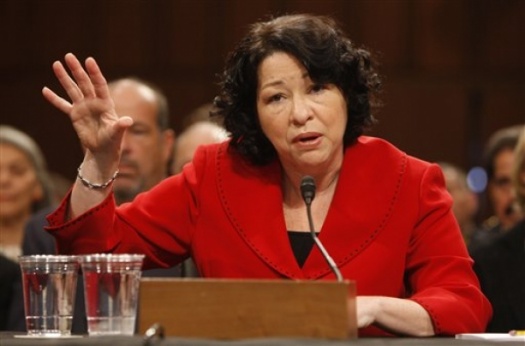
WASHINGTON — Supreme Court nominee Sonia Sotomayor stoutly denied racial bias Tuesday at her Senate confirmation hearing and said an oft-criticized remark about her Hispanic heritage affecting judicial decisions was a rhetorical device gone awry.
WASHINGTON — Supreme Court nominee Sonia Sotomayor stoutly denied racial bias Tuesday at her Senate confirmation hearing and said an oft-criticized remark about her Hispanic heritage affecting judicial decisions was a rhetorical device gone awry. An attempted play on words "fell flat" in a speech in 2001, Sotomayor told Sen. Jeff Sessions, R-Ala., referring to remarks in which she suggested that a "wise Latina woman" would usually reach a better conclusion than a white male. "It was bad because it left an impression that I believed that life experiences commanded a result in a case, but that’s clearly not what I do as a judge," Sotomayor said. Sessions, the senior Republican on the Judiciary Committee, sounded unconvinced. "As a judge who has taken this oath, I am very troubled that you would repeatedly over a decade or more make statements" like the one in 2001, he said. Republicans questioned Sotomayor closely, sometimes challenging her answers, on the second day of hearings. However, Democrats command a strong majority in the Senate as well as on the committee, and there appeared little or no doubt about her eventual confirmation as the first Hispanic to sit on the high court. Sen. Patrick Leahy, D-Vt., the committee chairman, told reporters Sotomayor would be confirmed and added, "I’m convinced it will not be a party-line vote." During the questioning, Sotomayor leaned into the table in front of her and spoke deliberately. She used her hands to reinforce her words, raising and lowering them to the table with palms flat and fingers extended. She scribbled notes to herself as senators spoke and bobbed her head to underscore her statements in reply. On an issue faced by all high court nominees, Sotomayor said the Constitution contains a right to privacy, a forerunner of the right to abortion that the high court first outlined in its 1973 Roe v. Wade ruling. Questioned by Sen. Herb Kohl, D-Wis., she said the right to abortion is "the Supreme Court’s settled interpretation of what the core holding is," as affirmed in a separate 1992 ruling. The issue of abortion rights has been central to Supreme Court confirmation fights for two decades or more, and with her statement, Sotomayor came close to saying the issue was settled law but stopped short of that flat declaration. Moments later, in response to a question by Sen. Orrin Hatch, R-Utah, she said, "All precedents of the Supreme Court I consider settled law subject to" a great deal of deference but not absolute. Sotomayor found common ground with Republicans on one issue. When Hatch condemned the liberal group People for The American Way for its criticism of a New Haven, Conn., firefighter who figures in a key court case, Sotomayor said such action was "reprehensible" and nothing she would tolerate. The committee schedule called for Sotomayor to field questions for hours as senators took 30-minute turns. Democrats were protective, occasionally offering her opportunities to counter her critics. Kohl noted, for example, that in 17 years as a trial and appeals court judge, Sotomayor had rarely been overturned by the Supreme Court. And he asked her sympathetically about an appeals court ruling that she joined that was recently reversed by the high court, in a case involving white firefighters in New Haven, Conn. He noted it was a 5-4 decision, and said, "Do you agree it was a close case and could have been decided one way or the other?" She replied, "To the extent that reasonable minds can differ on any case, that’s true." Leahy was the first to ask about the "wise Latina" comment that has sparked so much controversy. "I want to state upfront, unequivocally and without doubt: I do not believe that any racial, ethnic or gender group has an advantage in sound judging," Sotomayor said. "I do believe that every person has an equal opportunity to be a good and wise judge, regardless of their background or life experiences." Leahy also raised the recent case about New Haven firefighters, in which the Supreme Court said white firefighters were wronged when the city threw out the results of a promotion exam because too few minorities did well. She said the appeals court reached its decision because of precedent at the Supreme Court and at least one circuit court of appeals. But she said the ruling was overturned by the Supreme Court on the basis of a different standard. She said she would "absolutely" have reached a different result in light of the Supreme Court’s reversal. President Barack Obama nominated Sotomayor to replace Justice David Souter, who retired last month. While Souter was appointed by a Republican, President George H.W. Bush, he frequently sided with the court’s liberal bloc on controversial issues such as abortion and affirmative action. As a result, if confirmed, Sotomayor appears unlikely to alter the court’s balance of power on those issues. Associated Press writers Julie Hirschfeld Davis, Larry Margasak, Ann Sanner and Nancy Benac contributed to this story. ______ In photo: Supreme Court nominee Sonia Sotomayor testifies on Capitol Hill in Washington, Tuesday, July 14, 2009, before the Senate Judiciary Committee. (AP Photo/Ron Edmonds) Copyright 2009 Associated Press. All rights reserved. This material may not be published, broadcast, rewritten, or redistributed.